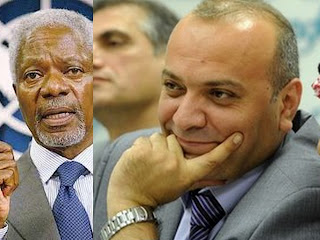 |
| By Syrian cartoonist Ali Ferzat |
The “morning after” Syria shot down Kofi Annan’s April 10 ceasefire deadline:
- Tariq Alhomayed, editor in chief of Saudi Arabia’s newspaper of record Asharq Alawsat, says the use of force against President Bashar al-Assad and his regime “is imperative now, not only to bring them down but to spare Syrian blood.”
- Ghassan Charbel, Lebanese editor in chief of the Saudi-owned pan-Arab daily al-Hayat, expects the next chapter in Syria to witness “tough and bitter maneuvers.”
- Russian analysts tell RAI Novosti “Annan’s plan won’t stop war in Syria” and Assad’s ouster is looming in the long term.
According to Alhomayed:
Whoever thought the Syrian regime subscribed to the Annan plan made a “grave and unjustified” mistake. The international community is fully aware Assad’s regime never fulfilled a pledge. No bank would give it an advance if it applied for a loan. Everyone should have known this.
Ironically, Annan says he is “shocked by recent reports of a surge in violence and atrocities in several town and villages in Syria… in violation of assurances given to me.” Problem is the international community remains “tongue-tied pending the expiry of Annan’s mission while Assad forces keep up their massacre and ethnic cleansing campaign.”
The international community “colluded with Assad” when it set one target date after another for him to continue his massacre of Syrian civilians.
“Any attempt to stop the crimes of this regime by diplomatic initiatives such as Annan’s, among others, is a misinterpretation of the nature of the tyrant’s regime in Damascus. Assad is getting away with all he is doing for the lack of any deterrence against him on the ground. All he hears is empty rhetoric from Turkey and a deafening silence from Obama, who is busy counting” the number of voters supporting his re-election rather than the number of Syrians killed.
Assad and his regime “understand nothing but the language of force. The use of force is imperative now, not only to bring them down but also to spare Syrian blood. Anything else is a waste of time, if not impotence and collusion with the criminal in Damascus.”
In Charbel’s opinion:
A triumvirate of three key players – Kofi Annan, the Syrian regime and the Syrian opposition – puts across a thorny landscape where “conditions for mediation are non-existent” and chances of killing fields and disaster scenes are vivid.
Paradoxically, each of the sides has strong and weak points at the same time.
Annan is strong because the UN mandated him. His weakness is that subsequent support for his mission was expressed “in UN statements for want of Security Council resolutions” for fear of being vetoed by Russia and China.
The Syrian regime is strong because foreign intervention was and remains off the table and because its killing machine remains as yet unflagging. “It is weak because it failed over the past year to stifle the opposition – not to speak of the harm to its status and to the image of its army and security services.”
The Syrian opposition is weak because “it failed to make major inroads into the regime’s military and diplomatic corps or to mobilize protests in Damascus” or overcome its own incertitude. It is strong because “restive townships resume protests soon after being stormed by the army and because it is still able to rally mass demonstrations, proving the ruling party has lost its way and its roots.”
In such setting, Annan asks of the Syrian authorities promises it cannot deliver on – i.e. cessation of armed violence, withdrawal of heavy weapons, unfettered movement throughout the country for journalists and respect of the right to peaceful demonstration. “How can the regime deliver on such promises today?”
The regime wants Annan to produce signed opposition undertakings to cease hostilities and disarm, which would be tantamount to sealed surrender documents. The opposition in turn wants guarantees from Annan that the political process would sink the regime – “something he cannot undertake.”
No wonder “tough and bitter maneuvers” are still in store for Syria.
The view from Moscow:
Annan’s plan is likely to stall Damascus’ successful crackdown on the opposition but hostilities will not end until Assad is ousted from power, Russian analysts told RIA Novosti.
Damascus had to accept Annan’s plan “for form’s sake” because rejecting a UN proposal would have painted it as a hardliner unfit for dialogue, Vladimir Bartenev, a global affairs analyst with Moscow State University, said.
“The situation is a mockery of the very idea of conflict settlement,” he added.
“The Free Syrian Army will use (a cessation of armed hostilities) to regroup after successful strikes by Assad’s forces in March,” said Bartenev.
It is just a formal nod by the global community to international norms of conflict settlement, said Alexei Malashenko, an analyst with Moscow Carnegie Center.
“The schizophrenic situation will go on while Assad is scrambling for a way to survive,” Malashenko explained.
Both Bartenev and Malashenko said despite Assad’s military success, his ouster is on the cards in the long term.
Assad emerged on top in the first phase of the civil war, taking control of the big cities and pushing his opponents to the mountains and countryside where they can resort to guerilla warfare, said Yevgeny Satanovsky, who heads the Moscow-based Middle East Studies Institute think-tank.
The Syrian president may yet stay in power if he followed the example of the Algerian junta that drowned its opponents in blood during the 1991-2002 civil war, Satanovsky said. But he also conceded that Assad’s opponents “will now be gradually uprooting him.”

